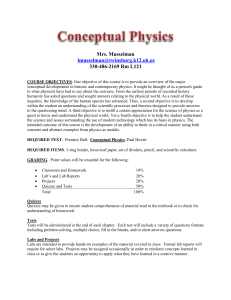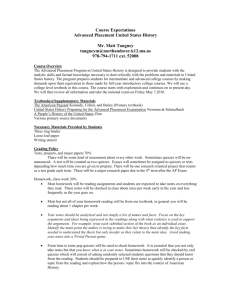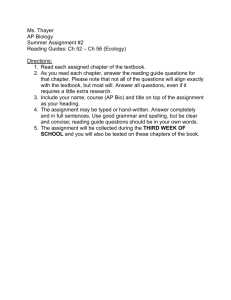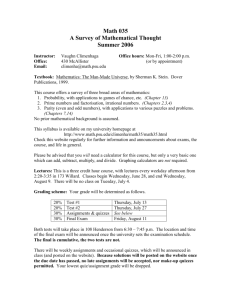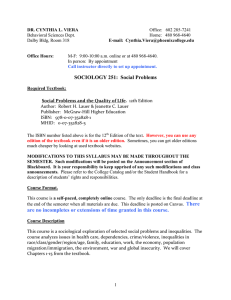Syllabus - University of Houston
advertisement
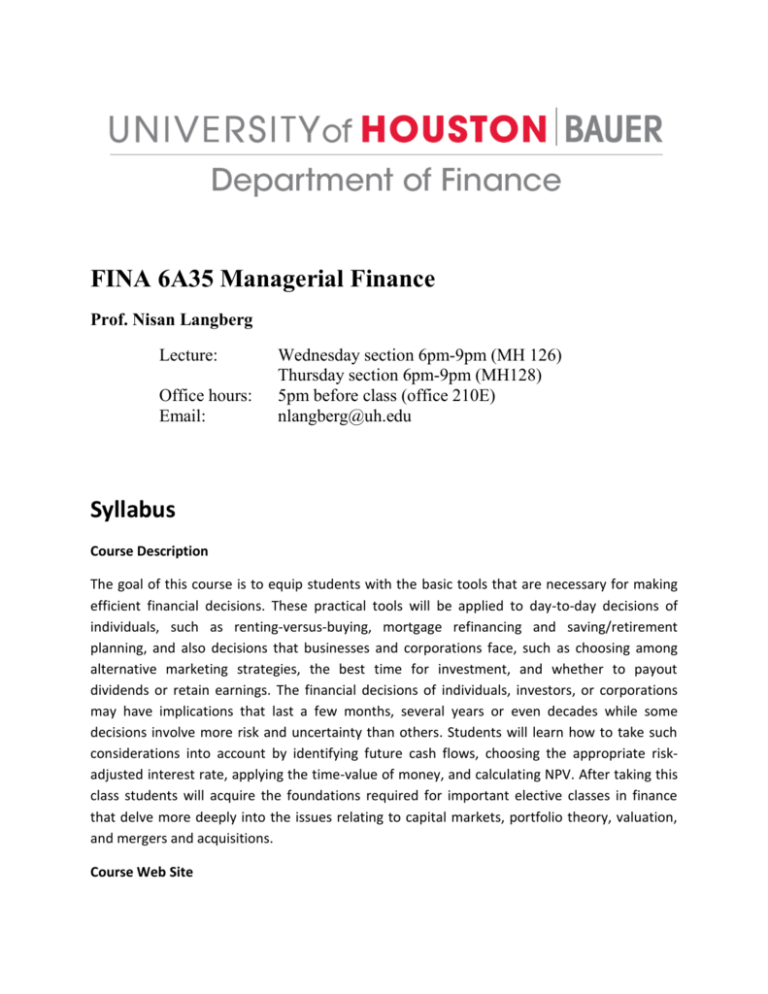
FINA 6A35 Managerial Finance Prof. Nisan Langberg Lecture: Office hours: Email: Wednesday section 6pm-9pm (MH 126) Thursday section 6pm-9pm (MH128) 5pm before class (office 210E) nlangberg@uh.edu Syllabus Course Description The goal of this course is to equip students with the basic tools that are necessary for making efficient financial decisions. These practical tools will be applied to day-to-day decisions of individuals, such as renting-versus-buying, mortgage refinancing and saving/retirement planning, and also decisions that businesses and corporations face, such as choosing among alternative marketing strategies, the best time for investment, and whether to payout dividends or retain earnings. The financial decisions of individuals, investors, or corporations may have implications that last a few months, several years or even decades while some decisions involve more risk and uncertainty than others. Students will learn how to take such considerations into account by identifying future cash flows, choosing the appropriate riskadjusted interest rate, applying the time-value of money, and calculating NPV. After taking this class students will acquire the foundations required for important elective classes in finance that delve more deeply into the issues relating to capital markets, portfolio theory, valuation, and mergers and acquisitions. Course Web Site Material will be posted on line. Students are encouraged to visit the class web site – specific URL will be provided in class. On the class web site students can find lecture notes beforehand – I recommend that students printout the class notes before they come to class each week. Also, handouts, announcements, and other class materials will be posted throughout the semester. Textbook The textbook for the course is Corporate Finance by Jonathan Berk and Peter DeMarzo, Addison-Wesley, 2nd or 3rd edition Another excellent textbook is Principles of Corporate Finance by Richard Brealey, Stewart Myers, and Franklin Allen, McGrawHill, 9th edition or higher Most of the material covered in class can be found in the textbook. The textbook also contains numerous real life examples, exercise problems and additional topics in finance that we will not cover in this course but this is covered in the more advanced courses in finance. Students might find the book useful for better understanding the material covered in class but also for in-depth coverage of other related topics. The textbook is a good investment for all students that seek to work in the area of finance and have an interest in corporate finance. I have asked for the textbook to be reserved in the library. Homework Homework assignments are designed to practice the concepts that are covered in the lectures and in the readings. They also offer a chance for students to apply new concepts to more complicated situations than are appropriate for the lectures. It is recommended to work on the homework assignments in groups (of at most four people). Remember to visit the class web page to be current on the due dates. Homework is due in class (hard copy). Late homework will not be accepted. If you are unable to attend class, you can submit homework via email any time prior to the beginning of class or you can leave it in my mailbox located near my office. Quizzes There will be two short quizzes during the semester (30 min each). Each quiz will include one short question based on the material learned in previous classes. Final Exam The final exam will be based on the material covered in class and assignments. The exam is with closed material, with the exception of two A4 sheets of paper that students should prepare and bring with them to the exam. Course Outline A tentative time-line is provided below. The actual material covered in class might change, homework due-dates might shift, and the course might not eventually cover all the material intended due to time constraints (Chapters are from third edition of BD). Wed/Thu 6-9 Week 1 August 26/27 Week 2 September 2/3 Week 3 September 9/10 Week 4 September 16/17 Week 5 September 23/24 Week 6 September 30/ October 1 Additional class Saturday October 3 9am-12 Week 7 October 7/8 Week 8 October 14/15 Topic covered and assignments Introduction/ begin Time Value of Money Time value of money (chapter 3.1-3.3, 4) Interest Rates (chapter 5) Basics of Bond Valuation (chapter 6.1-6.3) Practice questions chapters 3/4 due Quiz 1 (Time value of money) TA review session Investment Decision Rules (chapter 7) Practice questions chapters 5/6 due Quiz 2 (Interest Rates and Bond Valuation) Stock Valuation (chapter 9.1,9.2) Practice questions chapter 7 due Pricing Risk CAPM (chapter 10, 12.1-12.2) Review for final Practice questions chapters 9 due FINAL EXAM Office Hours Office hours will be held upon appointment. Students are of course welcome to approach me at the end of the class for clarifications or to discuss any other class related issues. If you have questions on the material covered in class, I encourage you to send me an email rather than waiting till the next class meeting in order to allow faster feedback. Grades The course grade will be based on the homework assignments, the two quizzes, and the final exam. The grading breakdown is as follows: the homework assignments count for 20%, the quizzes count for 20%, and the final exam counts for 60%. Required knowledge Prior knowledge of basic financial concepts or methodologies is not required. Knowledge of spreadsheet software (like Excel) will come in extremely handy. Accessibility Statement The University of Houston would like to help students who have disabilities achieve their highest potential. To receive academic accommodations, students shall register with the Center for Students with Disabilities (CSD) (telephone 713-743-5400). Academic Honesty Students are expected to follow the University of Houston’s Academic Honesty Policy. While I encourage students in my class to work in groups on homework assignments, I consider it a violation of academic honesty to sign one’s name to an assignment if others completed the assignment substantially.
